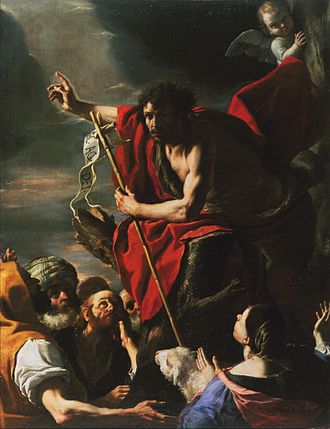A blessed Solemnity! We celebrate the birthdays of three ‘saints’ in our liturgical calendar: Christ Himself, the Son of God, of course, on Christmas Day; His Mother, the Virgin Mary, on September 8th; and, today, Saint John, called ‘the Baptist’, to whom was given the role as the last, greatest of the Prophets of the Messiah: Behold, the Lamb of God!
As the most ‘liminal’ of saints, John stands at the threshold between the Old and the New Testaments, the most momentous transition, if you will, in history, after the crossing of which nothing was, is nor will be ever the same again. Hence, the dividing of history between B.C. – before Christ – and A.D. – anno Domini, the year of our Lord (first put in place in the sixth century by the Scythian monk Dionysius Exiguus). Behold, I make all things new. Since then, we have been in the ‘last days’, ushering in that great eschatological fulfilment, in the context of which our temporal lives – indeed all of history – are but a prelude.
And speaking of days, this day was chosen, as it is six months before Christmas, and Mary, just after the Annunciation, visited her kinswoman Elizabeth when the latter was ‘in her sixth month’, and Mary, presumably, in her third. Yet it is also providentially fitting that we celebrate the Precursor just at the time of the summer solstice, the longest day of the year, after which they get incrementally shorter. As the Baptist put it, I must decrease, and He must increase. So it will be until the shortest day of the year, the winter solstice, just before Christmas, when the days get shorter, until another and greater birth is celebrated, and the daylight begins to increase again. As Josef Ratzinger explains in his Spirit of the Liturgy, the liturgical cycle really is cosmological, for all His creatures, Sun and Moon, stars and planets, praise Him.
Here is Saint Augustine from today’s Office of Readings:
John, it seems, has been inserted as a kind of boundary between the two Testaments, the Old and the New. That he is somehow or other a boundary is something that the Lord himself indicates when he says, The Law and the prophets were until John. So he represents the old and heralds the new…
Zachary is struck dumb and loses his voice, until John, the Lord’s forerunner, is born and releases his voice for him. What does Zachary’s silence mean, but that prophecy was obscure and, before the proclamation of Christ, somehow concealed and shut up? It is released and opened up by his arrival, it becomes clear when the one who was being prophesied is about to come.
This is also the official patronal feast day of Quebec, which, with the current secular milieu infecting the once-Catholic province, now goes by the name of la Fête nationale. Having abandoned the Faith and banned all ‘religious symbols’ for public employees – from crosses to hijabs – one may wonder where la belle province is headed. We may take some comfort in its historical Catholicism, still so evident in the churches, street and town names, monuments, side-road crosses and shrines. What was may yet be again, we may hope, at least with the supernatural virtue by that name. Along with faith and charity, it is more than enough. For the darkness does not win out in the end, for the Light is on its – or His – way, and will not tarry, even if in the meantime, we are all like voices crying out in the wilderness.
Saint Jean Baptiste, priez pour nous!










